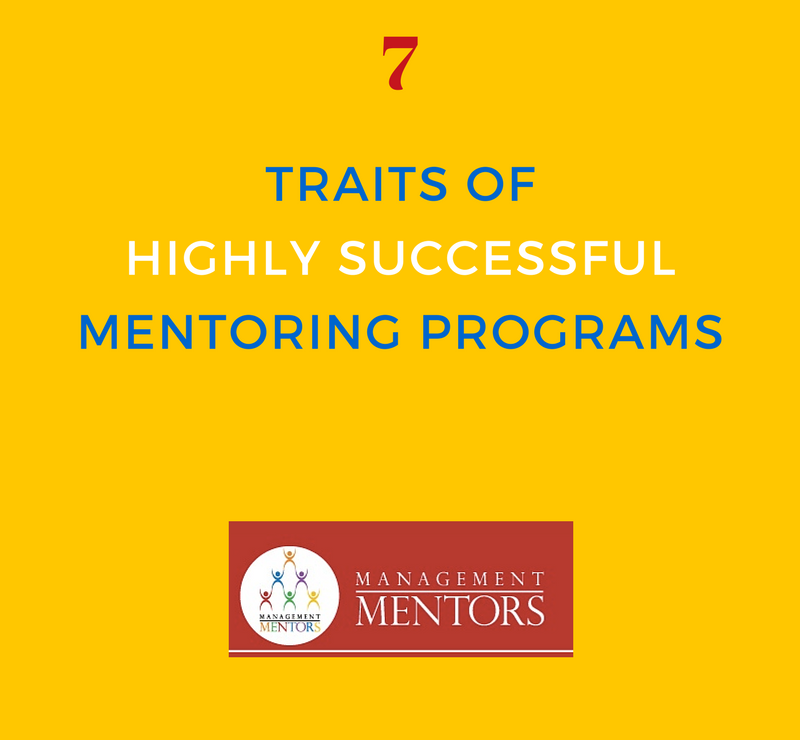
 Many organizations offer mentoring programs (or some form of mentoring). While many of these programs are decent and admirable, here’s the sad truth: truly successful mentoring programs—meaning ones that can sustain the success year after year—tend to be rare.
Many organizations offer mentoring programs (or some form of mentoring). While many of these programs are decent and admirable, here’s the sad truth: truly successful mentoring programs—meaning ones that can sustain the success year after year—tend to be rare.
So what’s the secret to creating a truly successful program? While a magic formula doesn’t exist, the most successful programs tend to have these seven traits in common.
1. The most successful mentoring programs are carefully designed. A well thought out mentoring program typically enjoys great success because someone took the time to think through its set up, its objectives, and the matches between mentors and mentees. Nothing is left to chance.
2. The most successful mentoring programs offer mentors, mentees, and program managers adequate training. While the mentoring concept comes naturally to most people, in order to truly “master” it, people need some training. It’s not unlike singing, for example. Some people can carry a tune and even sing well, but in order to take it to the next level, people need formal training.
The good news? This formal mentoring training doesn’t need to drain the budget or become a time-sink. E-learning courses, like the ones we offer, are budget-friendly and take only a few hours to complete. Other options include bringing in a mentoring consultant to provide a half-day or full-day training session prior to the mentoring program’s kick-off.
3. The most successful mentoring programs measure results. What’s the point in having a mentoring program if you don’t measure the return on investment (ROI)?
We often hear people complain that it’s impossible to show ROI when it comes to mentoring, but that’s not true. Things to measure:
- Have mentors and mentees rate the program (using a quantitative scale).
- Keep a database of program participants, specifically mentees, and compare their career trajectories with non-participants in similar roles (track promotions, raises, turnovers).
- Survey people within the company and get their reactions/feedback on the mentoring program, especially regarding any program participants they interact with or manage.
4. The most successful mentoring programs evolve. Mentoring is not a static activity. And even successful programs need to be tweaked and adjusted based on a variety of factors, including internal ones (e.g. a merger) and external (e.g. a new generation of workers entering the workforce).
Using our examples, a merger might mean an influx of employees (or a retraction). The program needs to adjust accordingly. A new generation of workers might require the program to recalibrate to address this new generation’s specific needs. To wit: as the Millennial generation began entering the workforce, companies had to rethink how they would mentor these new workers. Some programs shifted from strict one-to-one models to more collaborative group models as result, since Millennials tend to flourish in collaborative environments.
5. The most successful mentoring programs have someone in charge. It sounds so simple, right? While mentors and mentees can often work happily together once they’ve been matched, the program itself still needs a point person. This person can field questions from people outside of the program (e.g. upper management), address issues that pairs encounter, track ROI, learn/read/follow mentoring topics online, and provide support/training.
6. The most successful mentoring programs use mentoring software. Hey, it’s a digital world, folks. Sure, there are organizations out there that use old-school methods, such as spreadsheets, but honestly, the best programs invest in mentoring software. And yes, it is an investment, but that investment also serves as an incentive (“well, we’ve invested in the software; we might as well use it and get the most out of it”).
Note: we acknowledge that not all companies have the budgets for full-blown software, which is precisely why we offer our Precision Matching tool as a standalone product at a reasonable price.
7. The most successful mentoring programs don’t operate in a vacuum. Instead, the most successful programs match goals/priorities with other initiatives in the company: diversity, HR, corporate culture, etc.
Can you think of any other traits of highly successful mentoring programs?
{{cta(‘ac819860-e738-40c7-a4f4-e6768470e255’)}}